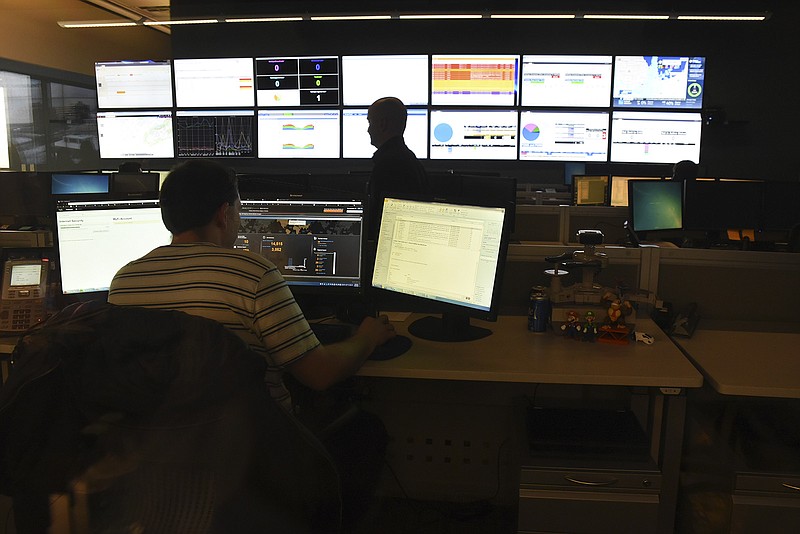A decade after EPB launched its biggest and costliest expansion into the world of television, telephones and Internet service, the $220 million venture by the city-owned utility appears to be paying off, according to an economic analysis prepared by the University of Tennessee at Chattanooga.
Fiber payoffs (2011-15)
* Increased reliability: Smart grid has cut 124.7 million customer minutes of interruptions over the past six years* Global publicity: Since 2010, Chattanooga and the “Gig City” were covered in at least 1,134 news stories reaching more than 1.8 billion viewers and readers, worth an estimated $24.3 million in advertising equivalency.* Business efficiency: Fewer outages, better energy controls and faster data links are projected to generate from $234.7 million to $266.4 million in gains* Customer savings: Smart grid should offer similar advantages to households worth $78.8 million to $121.8 million* New business investment: Faster telecom attracted or helped grow more business, projected to add from $198.2 million to $461.2 million in new investments* Increased jobs: Increased business activity supports 2,800 to 5,200 new jobs, both from new and expanding businesses.Source: University of Tennessee at Chattanooga Department of Finance, “The Realized Value of Fiber Infrastructure in Hamilton County, Tennessee.”
By the numbers
* 75,725: Number of EPB fiber optic customers, or 47 percent of all homes and businesses served by EPB * $220 million: EPB borrowing to build smart grid and fiber optic network throughout its 600-mile service territory * $111.7 million: Federal stimulus grant provided to EPB to help build smart grid in 2010 * $865.3 million to $1.3 billion: Net economic benefits from EPB fiber optics
Read more
Sohn: EPB's fiber folly not folly at all
An EPB-commissioned study by UTC's Department of Finance estimates EPB's smart grid and fiber optic network has helped add at least 2,800 jobs and pumped an extra $865.3 million into the local economy over the past four years by cutting power outages, improving data connections, lowering power bills and attracting businesses to the self-described "Gig City."
"This analysis suggests that the true economic value of the fiber infrastructure is much greater than the cost of installing and maintaining the infrastructure," said Benton Lobo, a professor of finance at UTC who authored the 69-page report.
The study found businesses identify high-speed Internet service and the smart grid as one of the top five reasons for locating here. Existing businesses and consumers also are able to operate more efficiently with faster Internet service and fewer electricity interruptions due to the upgraded EPB fiber optic network.
EPB's smart grid is estimated to have avoided 124.7 million customer minutes of interruptions by better detection of power faults and better methods of rerouting power to restore service more quickly than in the past. Faster Internet service also has saved consumers time and helped attract such data and tech businesses as HomeServe, Claris Networks and many of the startups at the CoLab and Lamp Post Group in downtown Chattanooga.
As the first city in the Western Hemisphere with gigabit-per-second Internet service, Chattanooga also has attracted hundreds of positive news reports and dozens of visits from delegations around the world. Lobo estimates that publicity alone has an advertising equivalency of $24.3 million.
EPB released Lobo's study Tuesday on the 6th anniversary of when EPB built out its high-speed Internet service,which EPB undertook after the city-owned utility took over Chattanooga's failed MetroNet in 2001.
EPB now boasts 75,725 customers signed up for at least one of its telecom services - cable TV, high-speed Internet or voice over Internet phone service - or 47 percent of those eligible for the service. Within its service territory in and around Chattanooga, EPB has surpassed Comcast as the biggest telecom and cable TV provider in only six years.
But Comcast still serves more consumers throughout the entire Chattanooga metro area and the cable TV provider recently launched a new type of Internet service, Gigabit Pro, that boasts 2 gigabit-per-second service to those willing to pay to hook up for the new links.
"Comcast has made over $2 billion in capital investments in Chattanooga and across Tennessee since 1996, including the development of an advanced Wi-Fi network across Chattanooga," said Alex Horwitz, vice president of communications at Comcast. "As one of Chattanooga's largest employers, we're proud to have recently unveiled our two-gigabit Internet service, which is moving the 'Gig City' into the next phase of its high-tech renaissance."
Critics of municipal broadband point to the new Comcast service and other new high-speed Internet links being made in many cities by Google and AT&T as proof that government utilities don't have to enter the competitive telecom business.
"This study from EPB shows the advantages of high-speed broadband, but that doesn't mean that the government has to use its power and taxing advantages to compete with the private sector to offer this service," said Mark Cunningham, communications director for the Beacon Center of Tennessee, a conservative think tank that opposes government utilities competing with private businesses.
But EPB officials said they launched their fiber optics network when private telecom providers like AT&T and Comcast declined to make the investment in Chattanooga.
Chattanooga Mayor Andy Berke said EPB's investment is helping Chattanooga develop into a nationally acclaimed "Gig City" for new tech startups.
"Because of our fiber optic infrastructure, we are creating economic development opportunities and good, middle-class jobs today as well as positioning Chattanooga to compete in the innovation economy of tomorrow," he said.
Hamilton County Mayor Jim Coppinger said EPB's high-speed broadband "delivers the fast connections and reliable video streaming that are critical to online learning and continuing education."
Contact Dave Flessner at dflessner@timesfreepress.com or at 757-6340.
